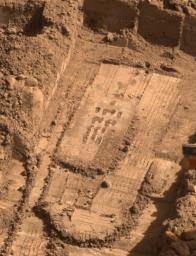
|
After Rasping by Phoenix in ‘Snow White’ Trench, Sol 60
- Click the image above for a larger view
- Full-Res JPEG (475 x 621) (67.7 kB)
- Full-Res TIFF (475 x 621) (886.2 kB)
Caption:
NASA's Phoenix Mars Lander used the motorized rasp on the back of its robotic arm scoop during the mission's 60th Martian day, or sol, (July 26, 2008) to penetrate a hard layer at the bottom of a trench informally called "Snow White." This view, taken by the lander's Surface Stereo Imager and presented in approximately true color, shows the trench later the same sol.
Most of the 16 holes left by a four-by-four array of rasp placements are visible in the central area of the image.
A total 3 cubic centimeters, or about half a teaspoon, of material was collected in the scoop. Material in the scoop was collected both by the turning rasp, which threw material into the scoop through an opening at the back of the scoop, and by the scoop's front blade, which was run over the rasped area to pick up more shavings.
Background Info:
The Phoenix Mission is led by the University of Arizona, Tucson, on behalf of NASA. Project management of the mission is by NASA's Jet Propulsion Laboratory, Pasadena, Calif. Spacecraft development is by Lockheed Martin Space Systems, Denver.
Photojournal Note: As planned, the Phoenix lander, which landed May 25, 2008 23:53 UTC, ended communications in November 2008, about six months after landing, when its solar panels ceased operating in the dark Martian winter.
Cataloging Keywords:
| Name | Value | Additional Values |
|---|---|---|
| Target | Mars | |
| System | ||
| Target Type | Planet | |
| Mission | Phoenix | |
| Instrument Host | Phoenix Lander | |
| Host Type | Lander | |
| Instrument | Robotic Arm | Solid-State Imaging (SSI) |
| Detector | ||
| Extra Keywords | Color, Rotation | |
| Acquisition Date | ||
| Release Date | 2008-07-24 | |
| Date in Caption | 2008-07-26 | |
| Image Credit | NASA/JPL-Caltech/University of Arizona/Texas A&M University | |
| Source | photojournal.jpl.nasa.gov/catalog/PIA10981 | |
| Identifier | PIA10981 | |
